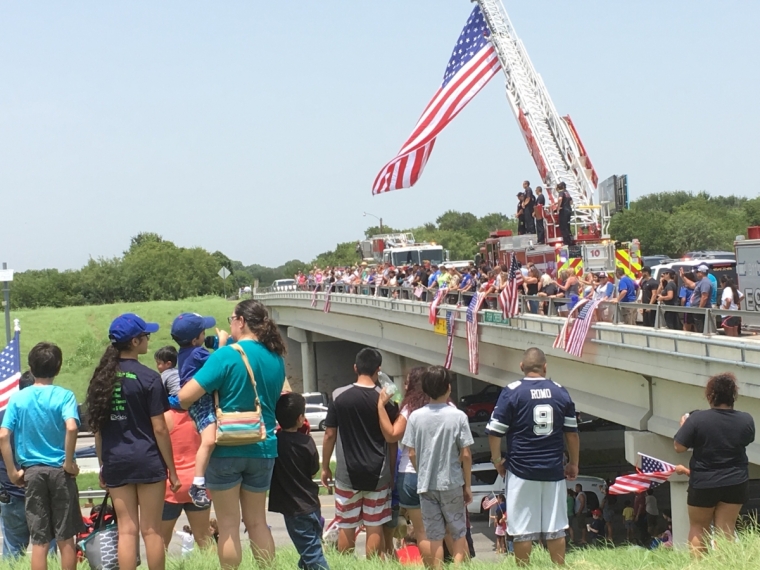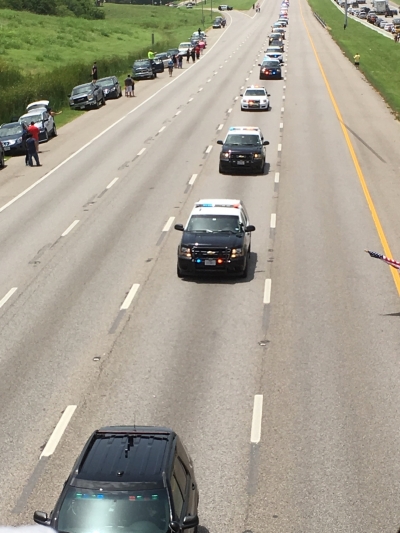'Praying' is important when tragedy strikes, counselors stress after police shootings

DALLAS/BATON ROGUE (Christian Examiner) —Strains of "Amazing Grace" wafted through the sanctuary of Mary Immaculate Catholic Church in Farmers Branch at the private memorial service for Sgt. Michael Smith, one of five Dallas Police Department officers slain last week.
Yea-Mei Sauer, Smith's sister, spoke at the July 13th service, expressing her rage at Smith's murder. Sauer revealed how her brother would have responded: "He would have told me to pray. Use the brain in that head of yours. And listen to your heart."
STORY CONTINUES BELOW VIDEO:
Prayer is not only a legitimate means of dealing with grief, it is highly recommended.
In an interview airing July 14 on Dallas station WFAA, reporter Sonia Azad questioned psychologist Trevicia Williams, Ph.D., regarding how to best deal with physical manifestations of grief and stress.
"Stress is a silent killer," Williams said. "After all we experienced last week, it is important to destress," and to "restore balance in our lives."
Williams recommended taking a "break from all the news, whether it's via television, the Internet or social media." Watching traumatic events repeatedly makes one relive them. "It's like opening the wound all over again. You are working against the brain's natural ability to heal."
When asked by Azad how to "shake off" grief and despair, Williams affirmed the value of prayer. "Praying is very important. Research has shown that...people who have a sense of faith tend to bounce back more quickly. They have a sense of hope and peace about them that all things work together for the good so praying is very important."
Williams also recommended exercise, stretching, not watching the news before bedtime, taking warm baths and avoiding afternoon caffeine to deal with the effects of grief-related stress. Talking through the tragedy with loved ones is also important, Williams noted.
Grief counseling becomes necessary, Williams said, "when you really can't just naturally shake it. Healing is a process. It's going to take time to overcome it, but when you find yourself constantly thinking about it and even maybe resorting to negative behavior, and negative thoughts, then it's important to seek professional help."
Pat Bicknell, retired psychology professor from Howard Payne University, also affirmed the value of grief counseling: "Grief counselors can play a big role as people go through shock, unbelief, why is this happening? Just none of it makes sense. [Tragedy] crates a really scary world for people."
Dealing with grief effectively begins with prayer, said Bicknell, who started the HPU counseling center and was involved in counseling at three colleges.
"Prayer invites the Lord into this whole circumstance where He has amazing healing power. He really heals," Bicknell said. In counseling, prayer is the first thing Bicknell does.
"Even if the person couldn't go there and pray, I would just quietly pray and ask the Lord to surround" the grieving person.

In offering grief counseling to people from various backgrounds and traditions, Stephanie Castillo of Farmington, N.M., first tries to understand where they are in the process and find out whether they have any faith background.
A graduate of Midwestern Baptist Theological Seminary in Kansas City, Castillo used her training in counseling to reassure grieving employees at a large industrial plant where she served in the human resources department. "Their feelings of confusion, anger, sadness and disbelief were normal," she shared, recognizing that everyone experiences and processes grief differently.
While some grief counselors approach their job from a secular approach devoid of any faith element, Castillo spoke to employees about the benefit of connecting with their spiritual beliefs, and journaling their thoughts. "Just getting their feelings out of their heads and onto something tangible gives them something they can look back at," she explained.
With thousands of people attending each of the funerals of the five Dallas policemen who were killed at the hands of an assassin, the stress of a grieving community weighs heavily on residents. "God leads other believers and unbelievers to us as they are going through these experiences, and we need to be faithful to pray and ask God to enter into their struggles and let them know God is not separate from their pain."
Help those who are grieving realize that God understand loss, Castillo advised, encouraging Christians to share the sacrifice God made through the loss of his own Son, Jesus Christ, opening the door to further witness to the salvation only God can offer.
As Baton Rouge mourns the loss of three police officers July 17, the head of the Louisiana State Police clearly stated his dependence on prayer. "We want and need your prayers," Col. Mike Edmondson shared at an afternoon press conference. "Baton Rouge is in need of your prayers right now."